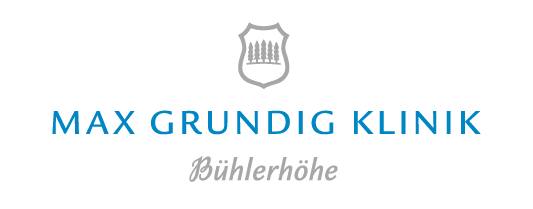Our Specialist Departments
A focused look on the inside - with the eyes of internists and psychologists
Our unique concept enables You to find excellent competence under one roof. Experts from all specialist departments ensure high-quality support – no matter where You need it. Because when it comes to Your health, we do not accept any compromises. We always strive to improve ourselves. Only the highest standards are good enough so that you are feeling well – it is for your own good.
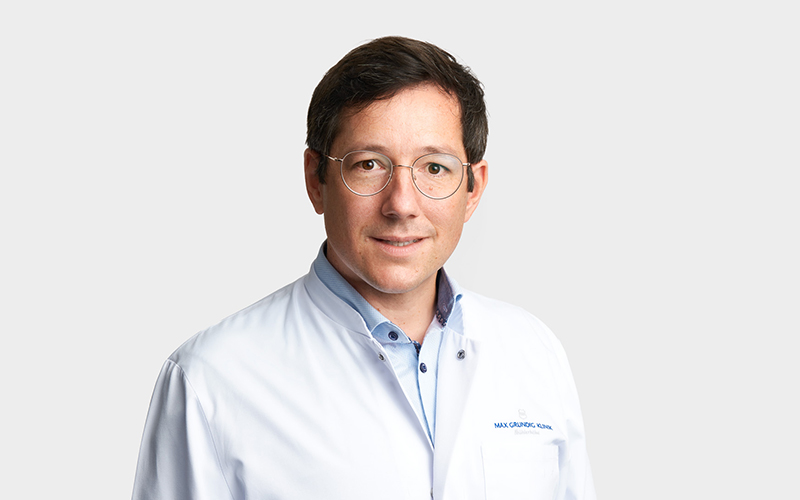
Prof. Dr. med. Timo Heidt
Head Physician Cardiology
Prof. Dr. med. Timo Heidt studied human medicine at the universities of Saarland and Freiburg im Breisgau. After his license to practice medicine in 2009, he completed his residency at the University Hospital Freiburg and University Heart Center Freiburg-Bad Krozingen and became a senior physician in the field of interventional treatment of coronary and structural heart disease in 2019. During a two-year research stay at the Massachusetts General Hospital of the renowned Harvard University, Boston, USA, he investigated the role of the innate immune system after myocardial infarction and the interactions between psyche and cardiovascular disease. After completing his habilitation in 2018, he was appointed associate professor at the Faculty of Medicine, Albert Ludwigs University, Freiburg, Germany, in 2022. He is a recognized expert in the field of interventional therapies as well as non-invasive imaging (cardiac MRI and CT). He holds additional training in cardiac MRI and is certified to the highest national and international standards. Through his experience as head of the blood pressure outpatient clinic at the University Heart Center Freiburg-Bad Krozingen, he specializes in the optimization of cardiovascular risk factors. He joined the Max Grundig Clinic in October 2023.
The Cardiology Department
In our cardiology department we focus on the detection of congenital or acquired heart diseases as well as on blood circulation and blood vessels that are close to the heart. The associated terms of cardiovascular diseases also include hypertension, stroke, arterial occlusive disease, and many other diseases.
Typical symptoms
- Chest pain (angina) under exertion, stress, or at rest
- Shortness of breath or shortness of breath
- Headache
- Dizziness
- Reduced performance
- Heart stuttering or palpitations
- Sudden brief loss of consciousness
- Abdominal pain
- Leg pain (in the sense of shop window disease or resting pain of the legs)
- Water retention (especially in the legs)
- Itching or skin lesions in the area of the legs
Cardiological examinations
- Medical history and admission examination: Initial examination with a careful collection of medical history as well as a thorough physical examination with determination of individual needs.
- Detailed laboratory examination: Detailed blood analysis taking into account all important organ systems in the in-house laboratory. Among other things, blood count, inflammation parameters, kidneys, liver, pancreas, metabolism including blood lipids and cholesterol, blood sugar and the thyroid are examined. In addition, iron balance and vitamin D present are checked, as well as urinalysis, protein electrophoresis, and tumor markers (colon, pancreas, prostate, breast).
- Ankle/arm blood pressure measurement (ABI+PWV measurement): Central cardiac and vascular baseline examination with blood pressure measurement of all four extremities to check patency of the arterial system and to look for circulatory disorders of the iliac/leg arteries.
- Resting ECG: measurement of cardiac current curves, derived from the chest, to detect cardiac arrhythmias and ECG changes that may indicate circulatory disorders
- Stress ECG / Stress echocardiography, if applicable: stress test of physical performance and blood pressure behavior with assessment of blood flow to the heart and to evaluate heart rhythm and blood pressure under stress.
- Echocardiography: cardiac ultrasound examination to assess cardiac output, heart size and valve function
- Long-term ECG and blood pressure recordings: assessment of heart rhythm and blood pressure at home and under everyday conditions
Interdisciplinary cardiovascular radiology
Together with Radiology (Prof. Dr. med. Peter Huppert), we offer cardiovascular focus diagnostics:
- Coronary CT: Precise imaging of the coronary arteries in collaboration with our radiology center.
- Cardio-MRI / Stress-MRI: Detailed tissue characterization in myocardial diseases, precise determination of cardiac function, non-invasive ischemia diagnostics in the absence of exercise capacity
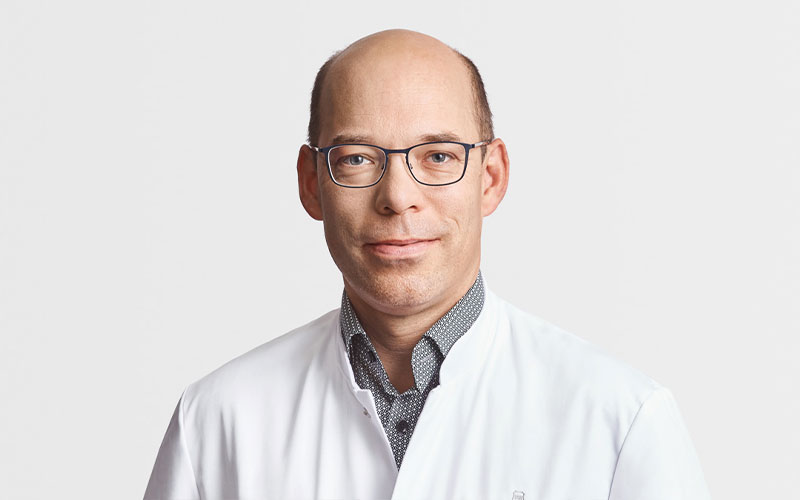
Dr. med. Timo Paulus
Head Physician Internal Medicine
Dr. Timo Paulus was born in Pforzheim in 1972. He studied human medicine at the University of Tübingen from 1992-1998. As an emergency physician, who is still active in the rescue service today, he acquired the additional title of emergency doctor. Four years later he became a specialist in internal medicine. In 2012, he received recognition for the subdomain cardiology (cardiovascular medicine) and in 2014 for angiology (vascular medicine). Since June 2018 he is Senior Physician at the Max Grundig Clinic.
The Angiology Department
Cardiovascular diseases remain a major cause of death in the Western world. With our cutting edge ultrasound technology, we are able to provide early diagnosis of the underlying arteriosclerosis and initiate the necessary preventive care measures without delay. Our clinic offers a comprehensive and ultra-modern diagnostic and therapeutic treatments for patients with vascular diseases. We adhere to the latest scientific findings and we strive to provide patients with the best possible diagnostic and therapeutic strategy in an interdisciplinary team.
Services
Acute Treatment
This includes the diagnosis and therapy of pulmonary artery embolisms, deep leg vein thrombosis, and circulatory disorders of the arteries (carotid artery, collarbone arteries/arm arteries, abdominal artery, renal arteries, pelvic/leg arteries).
Outpatient Examinations
- Clarification of pain, swelling tendency or heaviness of the legs
- Examination of renal arteries, especially for patients suffering from arterial hypertension
- Prevention, diagnosis, and therapy of arterial diseases (carotid artery, collarbone and arm arteries, abdominal artery, renal arteries, pelvic and leg arteries)
- Prevention, diagnosis, and therapy of leg vein diseases (thrombosis, varicose veins, superficial phlebitis)
Examination Methods
- Pressure measurement of the arm and leg arteries (including Ankle-Brachial-Index (ABI))
- Walking distance determination by means of treadmill
- Doppler- and color-coded duplex sonography
- Sonography of the deep and superficial leg veins
- CT-/ and MRT-Angiography together with the Radiological Department
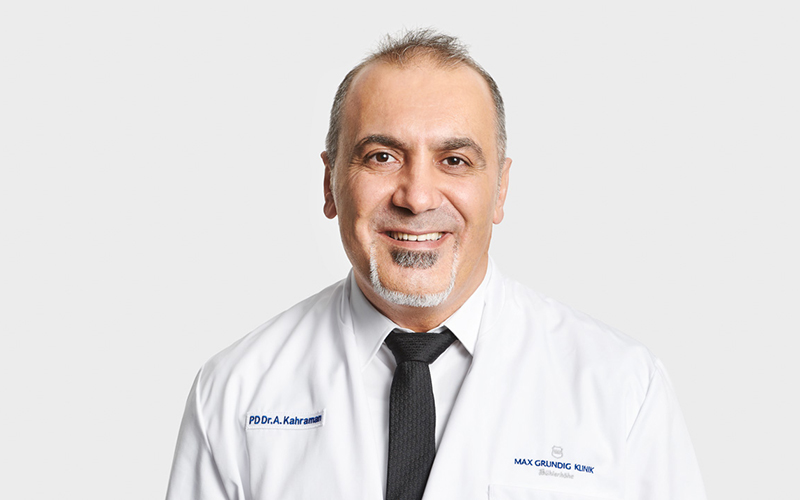
Prof. Dr. med. Alisan Kahraman
Head Physician Gastroenterology, Hepatology and Infectiology
Prof. Dr. med. Alisan Kahraman completed his studies in human medicine at the universities of Bochum and Essen. Subsequently, he was a resident physician at the University Hospital Essen in the Department of Gastroenterology / Hepatology. From September 2006 to November 2007, he conducted research on liver diseases at the world-renowned Mayo Clinic, Rochester, USA. He became a specialist in internal medicine in 2011 and a specialist in gastroenterology, hepatology and infectiology in 2015. Since 2020, he has been the chief physician for gastroenterology and hepatology at the Max Grundig Clinic. In January 2022, he received his professorship from the medical faculty of the University of Duisburg-Essen. Professor Kahraman holds the DGVS certificate for the treatment of CED (chronic inflammatory bowel disease).
The Gastroenterology Department
The Gastroenterology division plays a central role at the Max Grundig Clinic. It offers diagnosis, treatment, and prevention of diseases of the gastrointestinal tract and connected organs, including the liver, gallbladder, and pancreas.
Gastrointestinal Disorders
In Germany, one out of two people suffers from abdominal problems. At Max Grundig Clinic alone, we perform more than 1,000 colonoscopies a year, enabling early detection of bowel cancer. In around 25% of these cases polyps are diagnosed and removed immediately and painlessly. Over the years, we have performed more than 40,000 colonoscopies and gastroscopies. Our department also supports the work of other divisions within Psychological Medicine and Internal Medicine. This guarantees comprehensive and seamless care during Your stay with us. In addition, we work in close cooperation with Germany’s renowned Centre for Bowel Cancer, the “Darmkrebszentrum Mittelbaden”, to ensure we stay on top of the most recent scientific findings.
Services
General abdominal pain (type or cause):
- Acute abdomen
- Abdominal pain caused by allergies
- Peritonitis
- Pain related to circulatory, vascular and neurological diseases
- Intestinal obstruction (obstructive or paralytic ileus)
- Abdominal pain caused by vascular problems
- Infections and parasites
- Poisoning and metabolic disorders
- Autoimmune diseases
Conditions affecting specific organs (type or cause):
Stomach/Oesophagus
- Achalasia and related swallowing disorders
- Acute and chronic gastritis
- Gastro-oesophageal reflux disease (GERD), heartburn
- Infectious dysentery (acute vomiting)
- Stomach and duodenal ulcers
- Lymphoma, precancerosis, and carcinoma
- Oesophageal varices
Small and Large Intestine
- Chronic inflammatory bowel diseases (Crohn’s disease, colitis ulcerosa)
- Diverticular disease
- Intestinal polyps and tumours (prevention, polypectomy, EMR)
- Microscopic colitis
- Irritable bowel syndrome (IBS)
- Haemorrhoids, fissures, anal thrombosis
Liver/Gallbladder/Pancreas
- Alcoholic and metabolic fatty liver disease
- Amyloidosis
- Autoimmune hepatitis
- Ascites (peritoneal fluid excess)
- Pancreatic inflammation
- Structural and functional anomalies of the pancreas
- Biliary cirrhosis
- Cholangitis (bacterial or primary sclerosing)
- Cholelithiasis (gallstone disease)
- Cholecystitis (gallbladder inflammation)
- Jaundice
- Haemochromatosis
- Focal diagnostics (abscess, adenoma, focal nodular hyperplasia, metastasis, tumour, cyst)
- Drug-induced hepatopathy and cholestasis
- Postcholecystectomy syndrome
- Elevated liver values without a clear cause (for clarification)
- Viral and other non-viral hepatitis
Symptom complexes (type or cause):
Acute/chronic diarrhoea
- Food sensitivity and allergic gut reactions
- Bacterial miscolonisation of the intestine
- Neuroendocrine-related diarrhoea
- Bacterial enteritis / Traveler’s diarrhoea (salmonellosis, clostridia, novovirus, etc.)
- Enzyme deficiency diarrhoea (histamine, lactose, fructose intolerance, etc.)
- Bile acid malabsorption
- Jejunoileal fistula
- Anxiety-related diarrhoea
- Parasitic diarrhoea (lamblia, amoebas, Whipple’s Disease, trichuriasis, etc.)
- Paradoxical diarrhoea with enterostenosis
- Sprue syndrome (Celiac Disease)
- Toxic diarrhoea (heavy metal poisoning, drug-induced, food additives)
Constipation
- Dysbakteriosis
- Chronic constipation
- Mechanical obstruction
- Medications or malnutrition
Indications for inpatient rehabilitation:
- Problems following gastrectomy or partial enterectomy
- Chemotherapy follow-up treatment during or after treatment of gastrointestinal tumours
- Functional disorders and wound healing disorders following liver/gall bladder/pancreatic procedures
- Percutaneous endoscopic gastrostomy or parenteral nutrition in the event of severe malabsorption or palliative situation
- Pain therapy for chronic visceral hyperalgesia
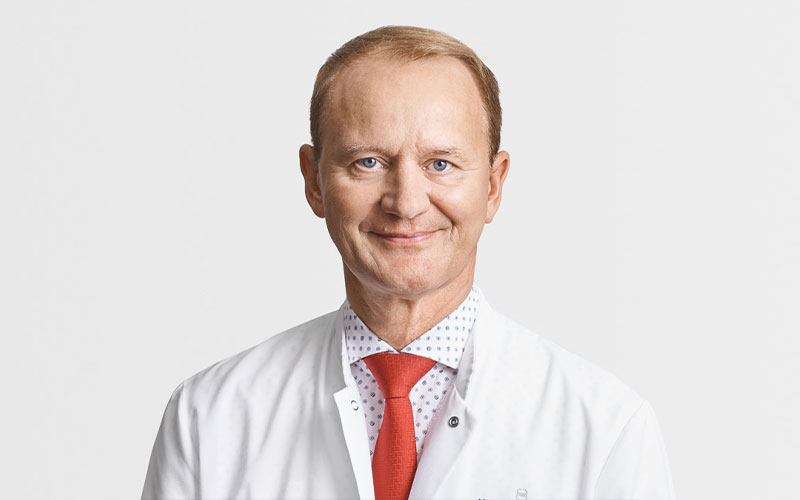
Dr. med. Ralf Goldschmidt
Head Physician Rheumatology
Dr. Ralf Goldschmidt, born in 1961, studied Human Medicine from 1983 to 1989 in Münster and Heidelberg. In 1995 he qualified as a specialist in Anaesthesia, in 2001 as a specialist in Internal Medicine, in 2003 he obtained an additional qualification for Rheumatology, and in 2009 he earned an additional qualification for Nephrology. Dr. Goldschmidt has been working at the Max Grundig Clinic with breaks since 1995 and since 2007 as Senior Physician.
The Rheumatology Department
Our diagnostic experience allows us to quickly analyse whether our patients are suffering from inflammatory or non-inflammatory diseases of the loco-motor system and what the causes are. This is the core of our treatment approach, which operates primarily on an outpatient basis. Our Rheumatology division also provides inpatient treatment. We are always in close contact with our colleagues from the other divisions of our clinic.
Rheumatic Diseases
Rheumatic diseases are very common in Germany. For example, almost a quarter of all Germans suffer from arthritis. Rheumatology, however, also includes inflammatory rheumatic disorders.
Cooperations
- Acura-Kliniken / Rheumazentrum Baden-Baden under the direction of Professor Fiehn
- Rheumatology department at the Heidelberg University Clinic under the direction of Professor Hanns-Martin Lorenz
- Dr. Jochen Meier from the Stadtklinik Baden-Baden
- Klinik für Orthopädie und Unfallchirurgie der Stadtklinik Baden-Baden under the direction of Professor Thomsen
- Hand surgery department of the German Red Cross (DRK) Clinic in Baden Baden
Clinical Picture
Inflammatory diseases of the musculoskeletal system
- Rheumatoid arthritis
- Polymyalgia rheumatica
- Spondylarthropathies like Morbus Bechterew
- Enteropathic spondylitis in Colitis ulcerosa, M. Crohn
- Septic arthritis
- Connective tissue diseases like Lupus and Scleroderma
- Giant-cell erteritis
- Diabetic arthropathy
Non-inflammatory diseases of the musculoskeletal system
- Coxarthrosis (Arthrosis of the hip)
- Gonarthrosis (Arthrosis of the knee)
- Finger arthritis
- Active arthritis
- Lumbar radiculopathy (Sciatica)
- Thorakalsyndrom
- Cervical spine syndrome
- Cervical radiculopathy
- Spondylitis hyperostotica
- Tendomyosis
- Tendopatha, insertion tendopathia
- Osteoporosis
- Fibromyalgia (FM or FMS)
- Myofascial pain syndrome
- Bone cancer
- Bone metastases

Dr. med. Ralf Goldschmidt
Head Physician Nephrology
Dr. Ralf Goldschmidt, born in 1961, studied Human Medicine from 1983 to 1989 in Münster and Heidelberg. In 1995 he qualified as a specialist in Anaesthesia, in 2001 as a specialist in Internal Medicine, in 2003 he obtained an additional qualification for Rheumatology, and in 2009 he earned an additional qualification for Nephrology. Dr. Goldschmidt has been working at the Max Grundig Clinic with breaks since 1995 and since 2007 as Senior Physician.
The Nephrology Department
The Nephrology division at the Max Grundig Clinic treats all kinds of kidney diseases. In addition to the standard outpatient treatments, we look after our inpatients’ every need and support the work of our colleagues from the Divisions for Internal Medicine and Psychological Medicine.
Kidney Diseases
Nephrology is a specialisation within the discipline of Internal Medicine focused primarily on the treatment of diseases affecting the kidneys. The kidneys function both as a filter as well as a purifier of the body. Should this function be impaired in the later stages of kidney diseases, a patient’s life can be in danger.
Clinical Picture
Kidney diseases and hypertension
- Terminal renal insufficiency requiring dialysis (hemodialysis and peritoneal dialysis)
- Condition after kidney transplantation
- After kidney and urinary tract surgery
- Kidney stones
Partnerships
- Acute care nephrology at Städtisches Klinikum Karlsruhe headed by Professor Hausberg
- Nephrology at Ortenau Klinikum Offenburg headed by Chief Physician Dr. Hornberger
- Dialyse – Zentrum Baden-Baden Dres. Schäfer, Lahl, Kronauer und Just

Dr. med. Christian Nagel
Private pneumology practice at the Max Grundig Clinic
Christian Nagel, MD, is the Chief Physician of the Department of Pneumology at the Klinikum Mittelbaden, Baden-Baden Balg site, and Senior Physician of the Center for Pulmonary Vascular Diseases/Pulmonary Hypertension of the Thorax Clinic at Heidelberg University Hospital. Since 2017, he has his independent pneumology private practice at the Max Grundig Clinic and is the consultant physician for pneumology.
The Pneumology Department
Lung diseases are among the most serious health problems worldwide. They are responsible for one fifth of all deaths. Since only about 20% of lung capacity is needed at rest and little more than 70% is needed even under maximum load with healthy lungs, shortness of breath often occurs only as a late sign of a lung problem. At the Max Grundig Clinic, complete non-invasive pneumology can be presented. The invasive (interventional) clarification of lung diseases by means of bronchoscopy (airway endoscopy), bronchoscopic ultrasound, right heart catheter, spiroergometry (performance measurement), video-assisted thoracoscopy (endoscopic chest endoscopy), as well as the surgical therapy of respiratory diseases, ventilation and intensive care therapy can be carried out in cooperation with the Klinikum Mittelbaden, location Baden-Baden Balg.
Pneumological Diseases
- Acute and chronic bronchitis
- Respiratory diseases (asthma and COPD)
- Pneumonia (lung inflammation)
- Pulmonary connective tissue diseases (pulmonary fibrosis, interstitial lung disease)
- Rheumatic involvement / co-disease of the lungs
- Smoking-related lung diseases
- Clarification of pulmonary foci / round foci / tumor-suspicious foci
- Pleural effusions / pleural diseases
- Acute and chronic pulmonary embolism
- Pulmonary vascular diseases / pulmonary hypertension with involvement of the right heart
Sarcoidosis - Lymph node enlargement of the mediastinum (middle pleura)
- Diseases of the diaphragm with or without the need for non-invasive mask ventilation
- Post-COVID / Long-COVID
- Sleep disorders / sleep-disordered breathing with or without need for CPAP therapy
Pneumological Examinations
- Lung function measurement
- Measurement of respiratory muscles / respiratory pump (P01 measurement)
- Diffusion measurement: measurement of gas exchange
- Methacholine provocation test: hyperexcitability of bronchial tubes
- Blood gas measurement (oxygen and carbon dioxide content of the blood)
- Allergy testing (prick intracutaneous test)
- Ultrasound of lungs, diaphragm, pleural cavity
- Ultrasound of the heart and pulmonary circulation
- Diagnostic and relieving (therapeutic) punctures of pleural effusions (pleural puncture)
- Diagnostic and therapeutic airway endoscopy (bronchoscopy) by Dr. med. Christian Nagel at Klinikum Baden-Baden / Klinikum Mittelbaden, including placement of airway stents, hemostasis, removal of foreign bodies, exposure of tumor-infested airways (recanalization)
Performance measurement by means of spiroergometry by Dr. Nagel at Klinikum Mittelbaden / Baden-Baden - Placement of chest drains (Bülau, Pleuracath) and permanent drains (PleurX) by Dr. Nagel at Klinikum Mittelbaden / Baden-Baden
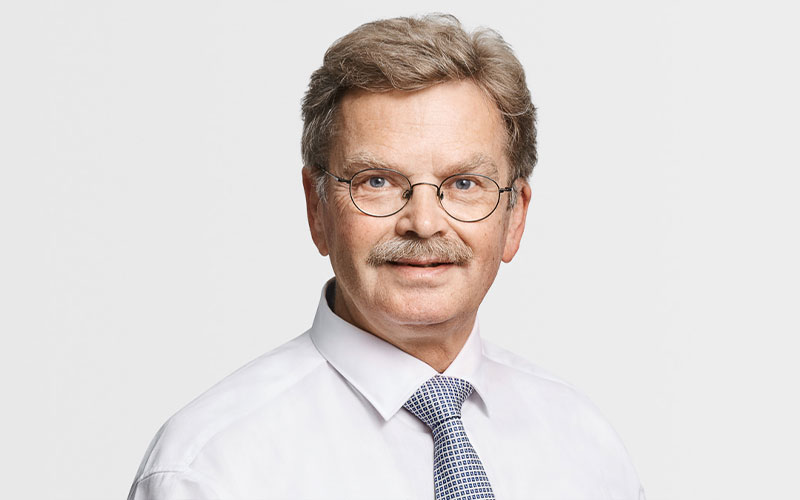
Prof. Dr. med. Peter Huppert
Head Physician Radiology
Prof. Dr. med. Peter Huppert studied human medicine at the University of Leipzig. In 1979 he was licensed as a physician, followed by further training as a specialist. His doctorate was awarded in 1984, as was his recognition as a specialist in radiology. In 1984 he began his work as a specialist in radiology and in 1989 became a senior physician in the Department of Radiological Diagnostics at the Department of Radiology at the University of Tübingen. In the same year he habilitated at the Medical Faculty of the University of Tübingen. From 1995 to 1998, he was Chief Senior Physician in the Department of Diagnostic Radiology in Tübingen, where he received the title of “Extraordinary Professor” from the University of Tübingen in 2004. From 1998 to 2019, he was chief physician of the Institute of Radiology, Neuroradiology and Nuclear Medicine at the Klinikum Darmstadt. He has published a total of 145 articles in scientific journals and contributed book chapters to 15 monographs. Prof. Huppert has more than 30 years of experience in interventional radiology. He authored the chapters on interventional treatment of peripheral arterial occlusive disease and on interventional treatment of liver tumors in the 2015 and 2021 German medical guidelines.
The Radiology Department
The radiology department of the Max Grundig Clinic combines the best for the benefit of its patients. Our declared goal – diagnostics at the highest level. Without compromise, we have therefore relied on the latest generation of imaging medical technology, which enables us to examine all regions of the body. The more precise and detailed the image quality, the more accurate the resulting evaluation and diagnosis. And let’s not forget – the faster the causes of disease are identified, the greater the chances of recovery with timely therapy. The diagnostic spectrum is supplemented by minimally invasive therapies of interventional radiology.
Medical equipment
MRI 3.0 Tesla
- High-end MRI with a magnetic field of 3.0 Tesla for higher contrast and precise images
- Bright and open design with 70 cm diameter
- Exceptional, soothing room ambience
- Examinations of all body regions
CT 128 lines
- Unique image quality with minimal radiation exposure
- Highest spatial and temporal resolution
- Low radiation exposure
- Examinations of all body regions
High-resolution detector mammography
Interventional Radiology
Interventional treatment procedures have undergone numerous methodological and technical advancements over the past two decades. They have become an attractive alternative to open surgery for many patients, particularly in vascular medicine; in other areas such as stroke treatment, oncology and pain therapy, they have significantly expanded the range of therapies.
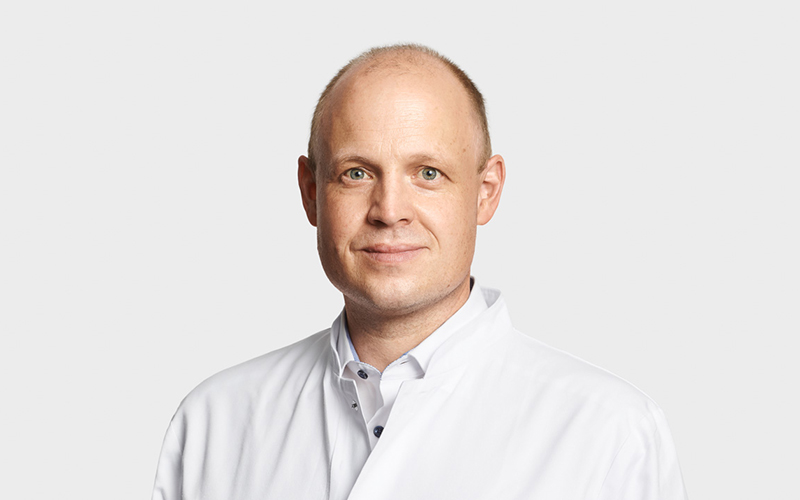
Prof. Dr. med. Stephan Kruck
Consultant Urologist
Prof. Dr. med. Stephan Kruck studied human medicine at the University Hospital of Tübingen. In 2014, he habilitated and received his professorship in urology in 2017. His research work has been recognized with numerous awards and grants. His clinical and scientific interests include precision diagnostics of prostate diseases, minimally invasive and robotic assisted therapy procedures. He is chairman of the DEGUM (German Society for Ultrasound in Medicine) Urology Section and the “Imaging Systems” working group of the DGU (German Society of Urology). Under his leadership, early prostate detection with artificial intelligence was established nationwide for the first time in 2021 with the help of BW state funding. The team of experts from the well-known urological center at Siloah St. Trudpert Klinikum in Pforzheim has been supporting the Max Grundig Clinic in all urological issues since fall 2020.
The Urology Department
A detailed non-invasive examination sequence prevents the need for invasive examinations in many cases. Only a few centers in Germany have the technical equipment for comprehensive urological diagnostics. The team of urology specialists at Siloah St. Trudpert Hospital in Pforzheim supports the Max Grundig Clinic’s team of urology physicians on a consultative basis. Thanks to this cooperation, the patient benefits from the complete range of services offered by both clinics.
the urological check-up
The main purpose of the urological check-up is the early detection of cancer, as 25% of all cancers are urological. Prostate cancer is the most common cancer in men in Germany, followed by bladder cancer (especially in smokers) and kidney, penis and testicle cancer. Regular screening examinations can diagnose and treat these diseases at an early stage. In addition to cancer screening, benign prostate enlargement with micturition problems as a common problem with advancing age and impotence and erectile dysfunction as an early warning sign of heart attack and stroke are among the top 3 conditions screened for during the urologic check-up.
Urologic Check-Up Routine Recommendations:
Men 45 years and older are recommended to be screened once a year. For men with a family history of the disease from the age of 40 (covered by general health insurance).
Services
Oncology
- Breast cancer
- Lung cancer
- Pancreatic cancer
- Colon cancer
- Gastric cancer
- Renal cell cancer
- Bladder cancer
Haematology
- Chronic anaemia
- Chronic leukaemia
- Diagnostic assessment of iron or vitamin B12 deficiency
- Initiation or continuation of chemotherapy for solid tumors
- Stem cell transplantation aftercare
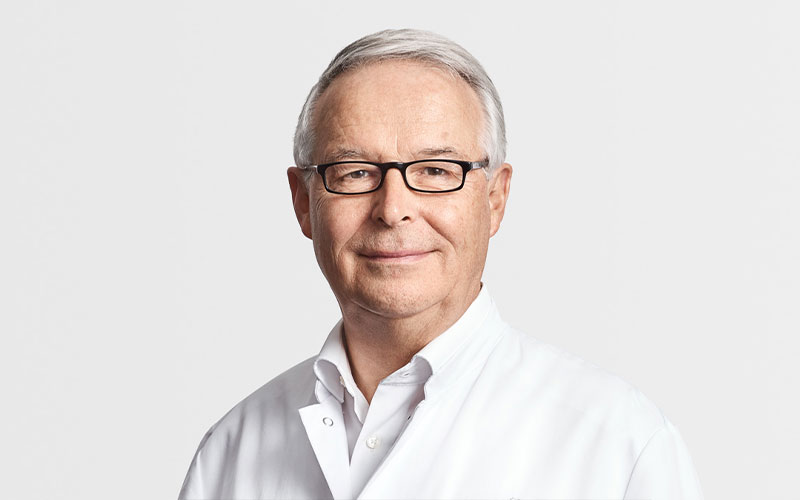
Prof. Dr. med. Clemens Unger
Head Physician Oncology
After completing a degree in education, Prof. Dr. Clemens Unger studied Human Medicine from 1972 to 1978 at the University of Göttingen. After earning his doctorate, he worked in research at the Max-Planck Institute for Biophysical Chemistry. From 1980 to 1988 he completed his specialized training in Internal Medicine/Haemato-oncology, a field in which he then completed his post-doctoral qualification. Between 1993 and 2011, Prof. Dr. Unger was Director of the Clinic for Internal Oncology at the University of Freiburg, and since 2011 he has been Senior Physician at the Centre for Cancer Medicine in Freiburg. Furthermore, Prof. Dr. Unger is a member of several international professional associations and is the recipient of numerous awards and prizes.
The Oncological Department
The Oncology division of the Max Grundig Clinic focuses on the treatment of cancerous tumors. In Germany alone, nearly 350,000 cases of cancer are diagnosed every year. Thanks to early detection and progress in medical treatment, it is now possible to cure many forms of cancer. At Max Grundig Clinic, we treat cancer with established chemotherapy in conjunction with other modern treatment methods. In addition, we also offer unconventional and alternative support treatments.
Cancerous Diseases
Prevention, treatment, follow-up care – the work of our Oncology division is characterized by three pillars. We offer screening programmes to help prevent oncological diseases, the best therapies for inpatient treatment based on the most current medical findings, and we also developed an individualised follow-up treatment programme: The therapy after therapy.
Services
Oncology
- Breast cancer
- Lung cancer
- Pancreatic cancer
- Colon cancer
- Gastric cancer
- Renal cell cancer
- Bladder cancer
Haematology
- Chronic anaemia
- Chronic leukaemia
- Diagnostic assessment of iron or vitamin B12 deficiency
- Initiation or continuation of chemotherapy for solid tumors
- Stem cell transplantation aftercare
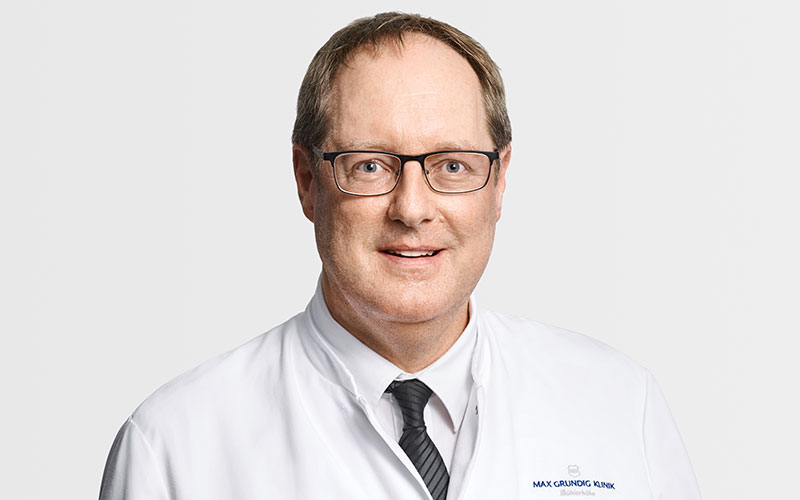
Dr. med. René Malzkorn
Head Physician Orthopedics
Dr. René Malzkorn was born in 1967. From 1986 to 1988 he completed his training in Physiotherapy at the University of Düsseldorf. From 1990 to 1998 he studied medicine and earned his doctorate, also at the University of Düsseldorf. He then completed additional training to qualify as a specialist in Surgery at the Clinic Calw. From 2003 to 2006 Dr. Malzkorn worked in the Spinal Surgery unit of the SHR Clinic in Karlsbad-Langensteinbach, where he headed the outpatient facility for Interventional Therapy as well as pediatric consultations for spinal deformities as Chief Physician from 2006 to 2011. Currently, Dr Malzkorn has a private practice specialising in conservative treatment methods in Nagold. Moreover, he has been a consultant physician for the Max Grundig Clinic since 2011.
The Orthopedic Department
Our Orthopedic division offers the full spectrum of orthopedic care, including prevention, diagnosis, and treatment of both congenital as well as acquired conditions involving the musculoskeletal system – the bones, joints, muscles, and tendons. The main focus of orthopedic services available at Max Grundig Clinic is on inpatient rehabilitation and recovery for disorders of the musculoskeletal system, including post-operative rehabilitation following hip or knee replacement and spinal surgery. Our rehabilitation programmes are individually tailored to every patient’s needs and include a detailed therapy and training schedule to guarantee a quick return to every-day life. Treatments are supported by our modern physiotherapy facilities and combine elements from occupational therapy, psychotherapy, and nutritional therapy.
Clinical Picture
Inflammatory diseases of the musculoskeletal system
- Rheumatoid arthritis
- Polymyalgia rheumatica
- Spondylarthropathies like Morbus Bechterew
- Enteropathic spondylitis in Colitis ulcerosa, M. Crohn
- Septic arthritis
- Connective tissue diseases like Lupus and Scleroderma
- Giant-cell erteritis
- Diabetic arthropathy
Non-inflammatory diseases of the musculoskeletal system
- Coxarthrosis (Arthrosis of the hip)
- Gonarthrosis (Arthrosis of the knee)
- Finger arthritis
- Active arthritis
- Lumbar radiculopathy (Sciatica)
- Thorakalsyndrom
- Cervical spine syndrome
- Cervical radiculopathy
- Spondylitis hyperostotica
- Tendomyosis
- Tendopatha, insertion tendopathia
- Osteoporosis
- Fibromyalgia (FM or FMS)
- Myofascial pain syndrome
- Bone cancer
- Bone metastases
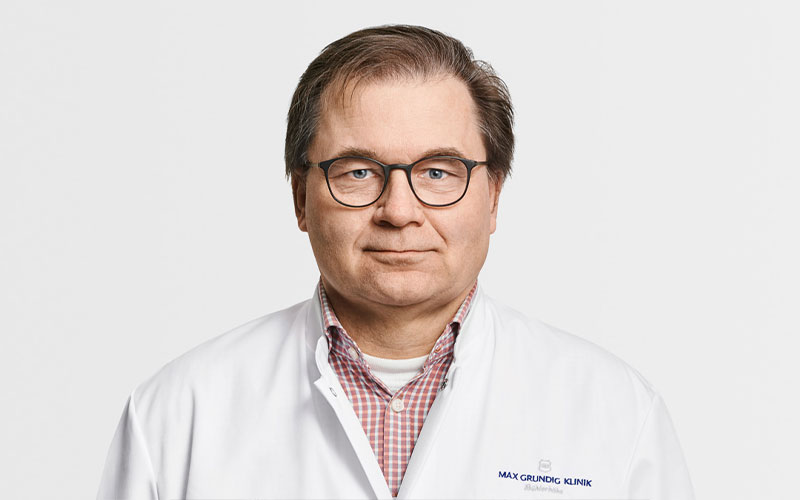
Dr. med. Christoph Müller
Consultant Neurology
Christoph Müller, MD, studied and received his doctorate in Freiburg from 1985 to 1991 and completed internships in London, Wattwil (Switzerland) and Timaru (New Zealand). After graduation, he was a resident in internal medicine at Friedrichshall Hospital and in neurology and psychiatry at Karlsruhe Municipal Hospital. In 1997 he passed the specialist examination for neurology and in 1999 he received the additional designation for neurological intensive care medicine. From 1998 to 2001, Dr. Müller was senior physician at the Neurological Clinic of the Karlsruhe Municipal Hospital. Since 2001, he has been a neurologist in private practice, until 2019 as a partner in a large group practice in Karlsruhe, and since October 2019 in his own practice in Karlsruhe Durlach. Since summer 2018, Dr. Müller has been working as a consultant at the Max Grundig Clinic.
The Neurology Department
Neurology deals with diseases of the brain, spinal cord and peripheral nerves. These include, for example, stroke, polyneuropathy, brain tumors, dementia, multiple sclerosis and Parkinson’s disease. These diseases can affect all age groups.
typical symptoms
- Circumscribed paralysis and weakness, also temporary
- Sensory disturbances such as tingling, numbness
- Gait unsteadiness, tendency to fall, swaying
- Deterioration of mental performance such as memory, concentration, tremors, twitching, cramps
- Stiffness, slowing of movements, reduction of facial expressions
- Visual disturbances such as double vision, temporary blindness in one eye
neurological examinations
- Electroencephalography (EEG): documentation of brain waves (similar to the ECG of the heart); important examination in the case of unclear falls, collapse or cognitive decline.
- Sonography: visualization of the brain-supplying arteries, also intracranial
- Neurography / SEP: Electrical measurement of peripheral nerves and spinal cord to check their functionality or the extent of damage
- Magnetic resonance imaging / computed tomography (MRI / CT): imaging of the brain, spinal cord and peripheral nerves. MRI / CT is used, for example, to detect small, asymptomatic strokes. It reliably detects tumors and vascular malformations.
- Electromyography (EMG): Sensing the electrical activity of muscles with a needle. This is used, for example, to detect muscle atrophy and weakness.
- Lumbar puncture: Extraction of nerve fluid from the spinal canal. This is used, for example, to detect chronic inflammation in the nervous system. The examination is rarely used in prevention.
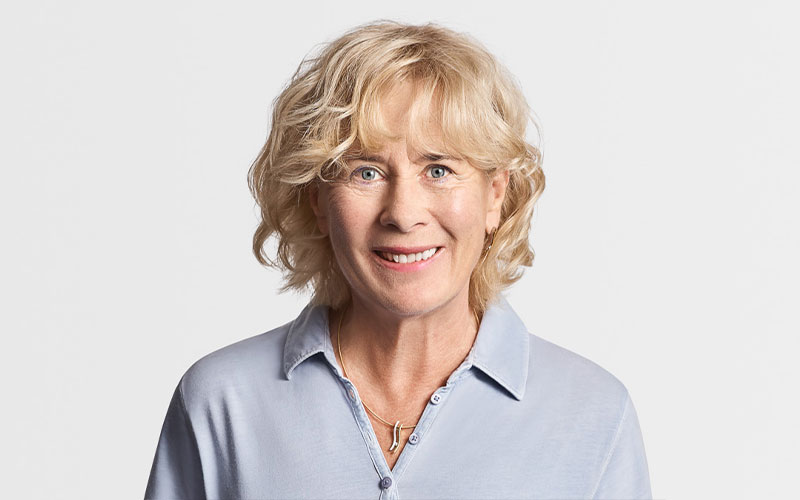
Dr. med. Gabriele Lindner-Wesel
Consultant Gynecology
Gabriele Lindner-Wesel, MD, studied medicine in Düsseldorf. She received her license to practice medicine and her doctorate in 1982, followed by clinical training as a specialist in gynecology and obstetrics in Bühl, Offenburg, Freiburg and Vienna. From 1989 to 2018, she worked as a resident physician in a joint practice with her husband, Lutz Wesel, MD. Since 2009, Dr. Lindner-Wesel has been a consultant physician at the Max Grundig Clinic and has since completed further training in endocrinology and bioidentical hormone therapy, “anti-aging medicine” and psychosomatic medicine. She is a graduate of the Anthony Robbins Mastery University (coaching training). In 2020 and 2022 she was recommended by FOCUS Health as a gynecologist and hormone specialist.
Gynecological spectrum
- Cancer screening and follow-up
- Diagnostics, therapy and advice on all health issues affecting women
- Contraception
- Hormone consultation
- Second opinion for gynecological questions
Diagnostics, assessment and therapy of
- Period disorders
- Premenstrual syndrome (PMS)
- Climacteric (complaints around menopause)
- Unfulfilled desire to have children
- Breast pain
- Libido disorders
- Hormone problems
- Urinary incontinence
gynecological examinations
- Detailed anamnesis structured according to holistic criteria.
- Physical examination of the female breast and pelvis
- Sonographic examination of breast and pelvis
- Vaginal sonography of the pelvis with assessment of the uterus, bladder, ovaries and fallopian tubes
- Cytological smear test of the cervix using the ThinPrep method (improved and more reliable diagnostic option for changes in the cervix)
- Microscopic assessment of the vaginal environment
- Assessment of the hormonal situation in case of corresponding questions by means of specific laboratory examinations
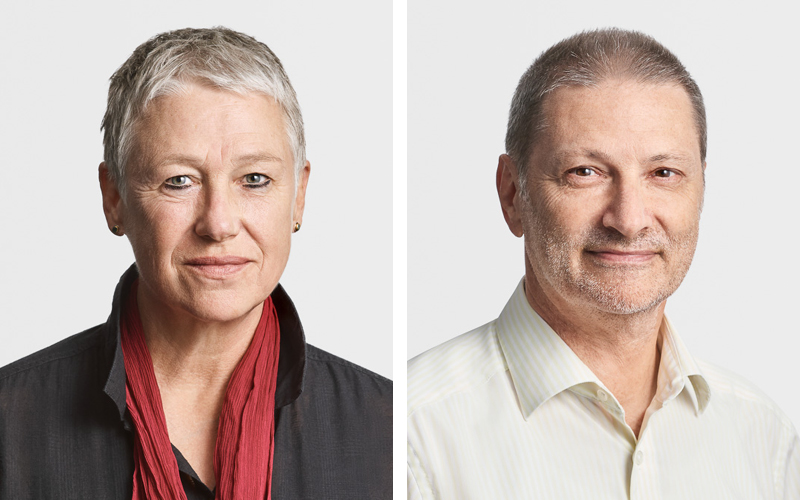
Gabriele Reuter and Dr. med. Heino Lisker
Head of Psychosomatics
Gabriele Lindner-Wesel, MD, studied medicine in Düsseldorf. She received her license to practice medicine and her doctorate in 1982, followed by clinical training as a specialist in gynecology and obstetrics in Bühl, Offenburg, Freiburg and Vienna. From 1989 to 2018, she worked as a resident physician in a joint practice with her husband, Lutz Wesel, MD. Since 2009, Dr. Lindner-Wesel has been a consultant physician at the Max Grundig Clinic and has since completed further training in endocrinology and bioidentical hormone therapy, “anti-aging medicine” and psychosomatic medicine. She is a graduate of the Anthony Robbins Mastery University (coaching training). In 2020 and 2022 she was recommended by FOCUS Health as a gynecologist and hormone specialist.
Clinic for psychosomatics
About 30% of German adults meet the criteria of a psychiatric-psychosomatic disorder each year. High-achievers in our society in particular suffer from stress-related symptoms and complain of reduced sleep quality, burnout and exhaustion, loss of memory, non-specific pain, depressive moods or anxiety. During the internal check-up, organic causes of such psychosomatic complaints are excluded. If the indication for inpatient psychosomatic treatment arises during the check-up or during the informative preliminary discussion, our team of the specialist clinic for psychosomatics will be at your side.
Treatment concept
The psychosomatic treatment concept is based on the high standard of modern cognitive-behavioral psychotherapy; if necessary, depth psychology-based methods are prescribed and applied. It comprises a multimodal spectrum of intensive individual and group therapies, which are both disorder-specific and geared to the patients’ personal goals. The quality of treatments is ensured through regular supervision, “state-of-the-art” continuing education, and scientific evaluations of the therapy process. The inpatient intensive therapy is supplemented according to indication by highly qualified co-therapeutic specialist therapists for sports, movement, body, relaxation, music, ergo, creative, art and physiotherapeutic measures.
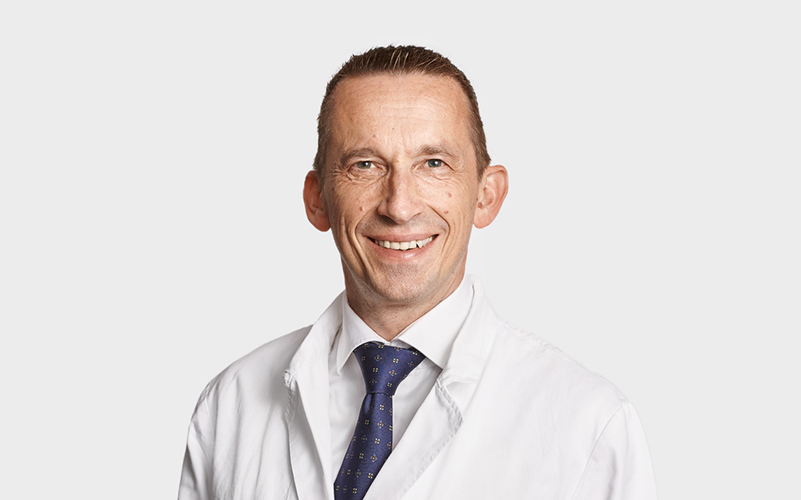
Dr. med. dent. S. Marcus Beschnidt
Consultant Dentistry
Dr. med. dent. S. Marcus Beschnidt studied dentistry at the University Hospital of Freiburg from 1990 to 1995. After his studies, he worked as an assistant physician and research associate in the Department of Dental Prosthodontics of the Department of Oral and Maxillofacial Surgery of the University Hospital of Freiburg. After receiving his doctorate in 1997, he became a senior physician and was appointed academic councilor in 1999. This was followed in 2001 by his appointment as a qualified advanced specialist in prosthodontics (DGPRO). In addition to teaching implant prosthodontics, he was certified by the DGI in implant dentistry in 2004 and was awarded a specialization in implant dentistry. Since 2004 he has been running his own dental practice at Brenners Park-Hotel & Spa, Baden-Baden. He has been an Active Member of the European Academy of Esthetic Dentistry (EAED) since 2007, a member of the Scientific Board of Prosec gGmbH since 2021 and a certified sports dentist / team dentist of the German Society for Sports Dentistry (DGSZM). Since 2021, he has supplemented the medical services of the Max Grundig Clinic on a consultative basis.
COOPERATION WITH THE DENTAL PRACTICE DR. BESCHNIDT IN BADEN-BADEN
Oral health is an essential part of general health and refers to the unrestricted functionality, freedom from inflammation and discomfort of the teeth, the periodontium (jaw bone and gums), the mucous membranes, the tongue, the temporomandibular joints and the salivary glands. Since the oral and jaw system is not only probably the most pleasurable beginning of the digestive tract, but also takes on an important function of our interpersonal interaction, aesthetics and phonetics (speech, singing) are becoming more and more important. Modern, scientifically based check-up programs are an important integral part of examining all factors of oral health.
Appointments are coordinated through the Max Grundig Clinic office. The treatments take place in his practice in Baden-Baden.
Dental examinations
- Dental anamnesis including evaluation of external documents: Detailed collection of the medical history in a personal interview.
- Extraoral findings (medical): Sensitivity, lymph nodes, scars, etc.
- Intraoral findings (tumor screening): Mucous membranes (smoker’s leukoplakia, precancerous lesions, lichenoid disease), tongue (impressions, hairy tongue, precancerous lesions), alveolar ridges (bone loss, ridge defects), saliva (salivary flow strength, salivary texture).
- Dental findings: tooth pulp (number, positional anomaly, crowding, diastemata), tooth status (caries, abrasions, erosions, fractures, discoloration), restorations (fillings, crowns, bridges, dentures), tooth color determination, tooth vitality test, percussion test
- Periodontal findings: measurement of gingival pockets (pocket depth, bleeding tendency), tooth loosening, bone loss, gingival recession
- Functional findings: bite position, occlusion type, temporomandibular joint diagnostics
(cracking, rubbing, limitations, pain, disc displacements), masticatory muscles (myogeloses, tensions, dysfunctions, dyskinesias) - Radiological findings (digital with significantly reduced radiation dose): Orthopantomogram (temporomandibular joint, maxillary sinuses, nerve courses, alveolar bone courses, pathological processes)
- Making tooth-related diagnoses: caries, (in)sufficient restorations, pulpitis, root fillings, periodontitis, gingivitis.
- Discussion of the patient’s wishes and options in a detailed consultation
- Detailed consultation (min. 60 min) with discussion of patient’s wishes and options
- Preparation of an individual report including all X-ray findings

Dr. med. Oliver Barsom
Consultant Dermatology
Oliver Barsom, MD, studied human medicine at the University of Budapest from 1983 to 1989. Subsequently, he trained as a dermatologist in Lübeck, Nuremberg and Heilbronn. Since 1995, he has been a dermatologist in private practice in Baden-Baden, and for the past 25 years he has provided consultation services to the Städtisches Klinikum Mittelbaden and other clinics. Since 2021, Dr. Barsom has supplemented the medical services of the Max Grundig Clinic on a consultative basis.
COOPERATION WITH THE DERMATOLOGY PRACTICE DR. MED. OLIVER BARSOM IN BADEN-BADEN
Dermatology deals with diseases of the skin, mucous membranes and skin appendages such as hair and nails. The clarification and treatment of allergies are also part of the specialty of dermatology.
Appointments are made through the secretary’s office of the Max Grundig Clinic. The treatments take place in his practice in Baden-Baden.
EARLY SKIN CANCER DETECTION
If skin cancer is detected at an early stage, it is basically curable. This is often not detectable by blood tests. The experienced eye of the dermatologist with the aid of computer-assisted reflected-light microscopy can help. If you discover changes of any kind on your skin, this should be reason for a visit to the dermatologist. I generally recommend annual checks of the entire skin. Moles taken by the dermatologist can be better inspected for abnormalities when stored in the computer and can be better controlled for changes by comparing them with the image from the past.
DERMATOLOGICAL SPECTRUM
The high technical standard of the practice forms the basis for a contemporary and successful treatment. With the latest equipment and applications, patients are offered the best possible treatment. The dermatology practice of Dr. Barsom covers the entire spectrum of clinical dermatology as well as a wide range of cosmetic dermatology.
- Computerized skin spot analysis
- Skin cancer screening
- Laser-assisted photodynamic therapy (PDT) of precancerous skin lesions (solar keratoses)
- Removal of pathological or cosmetically disturbing skin changes
- Treatment and testing of allergies (e.g. hay fever, food allergies, contact allergies)
- Treatment of spider veins
- Hair disorders
- Mucous membrane diseases
- Venereal diseases
- Cryotherapy (icing treatment)
- Light therapy for the treatment of skin diseases
- Bath PUVA therapy for the treatment of psoriasis, neurodermatitis
- Water-filtered infrared light therapy (WIRA) for warts and chronic wounds
- Removal of unwanted hair by means of IPL
- Wrinkle treatment using Botox or hyaluronic acid
- Injection lipolysis (fat way injection)
- Fox laser therapy for nail fungus diseases
- Laser treatment of benign moles, milia, fatty deposits on the eyelids, age-related irregularities of the skin, age warts, age spots, age-related blood sponges, wrinkles, warts on the soles of the feet, dilated veins on the face, acne scars, tattoos
